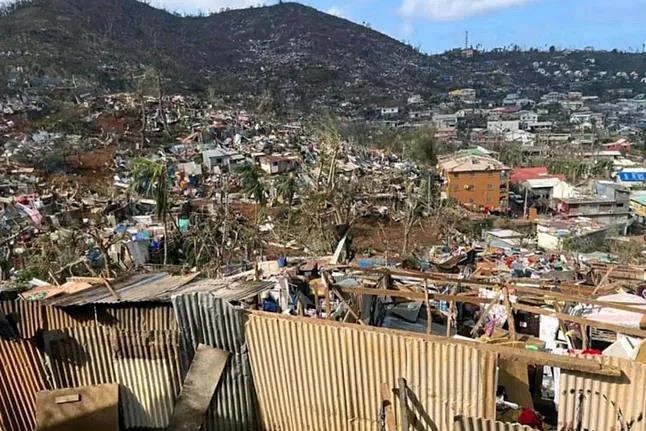The number of dead in the French territory of Mayotte due to cyclone Chido could reach 1,000, the island's top government official reported on Sunday.
Prefect François-Xavier Bieuville told Mayotte La 1ère television station: "I believe there are several hundred dead, maybe we are approaching a thousand."
Bieuville explained that it was "extremely difficult" to give an exact number at this time, after the Indian Ocean islands were hit by the intense tropical cyclone on Saturday, causing widespread destruction. Earlier on Sunday, authorities had confirmed at least 11 deaths in Mayotte, but that number was expected to rise.
Mayotte, located in the southeast of the Indian Ocean off the coast of Africa, is the poorest island of France and the poorest territory in the European Union.
The intense tropical cyclone made landfall on the east coast of Africa, where aid agencies warn of more loss of life and severe damage in northern Mozambique. The cyclone also affected Comoros and Madagascar. Mayotte was directly in its path and suffered extensive damage on Saturday, according to officials. The Mayotte prefect noted that it was the worst cyclone to hit the area in 90 years.
French Interior Minister Bruno Retailleau stated on Saturday night, after an emergency meeting in Paris, that they feared the number of fatalities in Mayotte "would be high" and that the island had been largely devastated.
French Prime Minister François Bayrou, who took office on Friday, stated that public infrastructure in Mayotte was severely damaged or destroyed, including the main hospital and the airport. He also highlighted that many people living in precarious huts face very serious risks.
Cyclone Chido brought winds of over 220 kilometers per hour (136 miles per hour), according to the French meteorological service, which classified it as a category 4 cyclone, the second strongest on the scale. In some areas of Mayotte, entire neighborhoods were flattened, while local residents reported many uprooted trees and overturned or sunken boats.
The French Ministry reported that 1,600 police officers and gendarmes had been deployed to "assist the population and prevent possible looting." Additionally, about 110 rescuers and firefighters were sent to Mayotte from France and the nearby territory of Reunion, with an additional 140 people expected to be sent on Sunday. Supplies were also being rapidly dispatched by military planes and ships.
French President Emmanuel Macron indicated that he was closely monitoring the situation, while Pope Francis offered prayers for the cyclone victims during a visit on Sunday to the French Mediterranean island of Corsica.
Chido continued its path eastward and made landfall early Sunday in Mozambique, where emergency authorities had warned that 2.5 million people could be affected in two northern provinces: Cabo Delgado and Nampula. Malawi and Zimbabwe, two landlocked countries, were also preparing to be affected, with both governments warning of possible evacuations in low-lying areas due to flooding.
In Mozambique, the United Nations Children's Fund (UNICEF) reported that Cabo Delgado province, home to around 2 million people, had been severely hit. "Many homes, schools, and health facilities have been partially or completely destroyed, and we are working closely with the government to ensure the continuity of essential basic services," a spokesperson stated. "Although we are doing our best, additional support is urgently needed."
From December to March is the cyclone season in the southeast of the Indian Ocean, and southern Africa has been hit by a series of strong cyclones in recent years. Cyclone Idai in 2019 left over 1,300 dead in Mozambique, Malawi, and Zimbabwe. Cyclone Freddy, on the other hand, caused over 1,000 deaths in several countries last year.
Cyclones bring the risk of floods and landslides, but stagnant water can also later trigger deadly outbreaks of waterborne diseases such as cholera, as well as dengue and malaria. Recent studies indicate that cyclones are worsening due to climate change. This phenomenon leaves the poor countries of southern Africa, which contribute minimally to global warming, facing major humanitarian crises, underscoring their call for more assistance from wealthy nations to address the impact of climate change.
